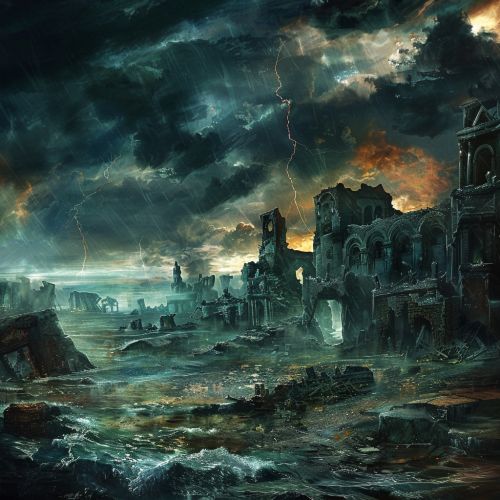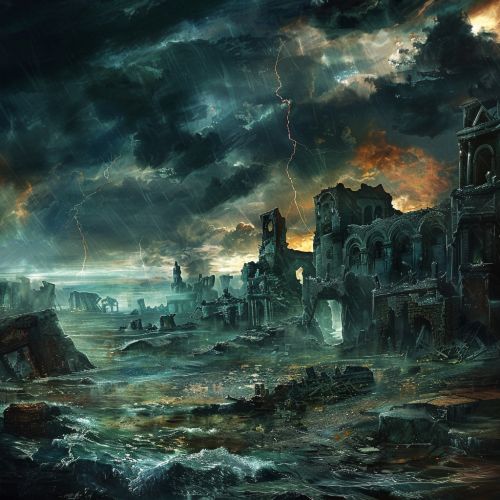End Times
Introduction
The term "End Times" refers to a future period of time that many religious, esoteric, and philosophical traditions believe will mark the culmination of human history and the ultimate destiny of humanity. This concept is often associated with eschatology, which is the study of the end of the world or the ultimate fate of humanity. The End Times are characterized by a series of cataclysmic events and significant transformations that are believed to precede the final judgment or the establishment of a new, divine order.
Religious Perspectives
Christianity
Christian eschatology is primarily derived from the Bible, particularly the books of Daniel, Ezekiel, and Revelation. According to Christian belief, the End Times will be marked by the Second Coming of Jesus Christ, who will return to judge the living and the dead. Key events include the Rapture, the Tribulation, and the Millennium.
The Rapture
The Rapture is a concept where believers in Christ are expected to be taken up to heaven, leaving the unbelievers behind to face the Tribulation. This event is based on interpretations of passages such as 1 Thessalonians 4:16-17 and 1 Corinthians 15:51-52.
The Tribulation
The Tribulation is a period of severe suffering and chaos on Earth, lasting seven years according to some interpretations. It is believed to be a time of great trials and divine judgments, as described in the Book of Revelation.
The Millennium
The Millennium refers to a thousand-year reign of Christ on Earth, a period of peace and righteousness. This concept is derived from Revelation 20:1-6 and is interpreted differently among various Christian denominations.
Islam
In Islamic eschatology, the End Times are known as Qiyamah or the Day of Judgment. Key figures include the Mahdi, a messianic figure who will restore justice, and Isa (Jesus), who will return to defeat the Dajjal (the Antichrist).
Signs of Qiyamah
Islamic texts describe both minor and major signs that will precede Qiyamah. Minor signs include moral decay and widespread injustice, while major signs involve cosmic events and the appearance of the Mahdi and Isa.
Judaism
Jewish eschatology focuses on the coming of the Messiah, a future Jewish king from the Davidic line who will rule during the Messianic Age. This period is characterized by peace, justice, and the rebuilding of the Third Temple in Jerusalem.
The Messianic Age
The Messianic Age is a future era of global peace and divine presence. It is believed that the Messiah will gather the Jewish exiles, restore the Temple, and establish a kingdom based on Torah law.
Philosophical and Secular Perspectives
Secular Eschatology
Secular eschatology often involves scientific and philosophical theories about the end of human civilization or the universe. These theories can include scenarios such as nuclear war, climate change, and technological singularity.
Technological Singularity
The technological singularity is a hypothetical future point where technological growth becomes uncontrollable and irreversible, potentially leading to unfathomable changes in human civilization.
Climate Change
Climate change poses significant risks to the future of humanity, including extreme weather events, rising sea levels, and loss of biodiversity. These changes could lead to societal collapse if not addressed.
Philosophical Views
Philosophers have long speculated about the ultimate fate of humanity and the universe. Some, like Friedrich Nietzsche, have explored the concept of eternal recurrence, while others, like Immanuel Kant, have pondered the moral implications of an end-time scenario.
Cultural Representations
The End Times have been a popular theme in literature, film, and art. Works such as Dante's Inferno, The Road by Cormac McCarthy, and films like Mad Max explore various aspects of apocalyptic and post-apocalyptic scenarios.


Scientific Theories
Cosmological Theories
Cosmologists have proposed several theories about the ultimate fate of the universe, including the Big Freeze, the Big Crunch, and the Big Rip.
The Big Freeze
The Big Freeze, also known as heat death, is a theory that suggests the universe will continue to expand until it reaches a state of maximum entropy, where all energy is evenly distributed, and no thermodynamic work can occur.
The Big Crunch
The Big Crunch posits that the expansion of the universe will eventually reverse, leading to a collapse back into a singularity, potentially resulting in another Big Bang.
The Big Rip
The Big Rip is a hypothesis that suggests the universe's expansion will accelerate to the point where all matter, from galaxies to atoms, will be torn apart.
Astrobiological Considerations
Astrobiologists study the potential for life beyond Earth and the implications of cosmic events on the survival of humanity. Events such as gamma-ray bursts and supernovae could have catastrophic effects on Earth.
